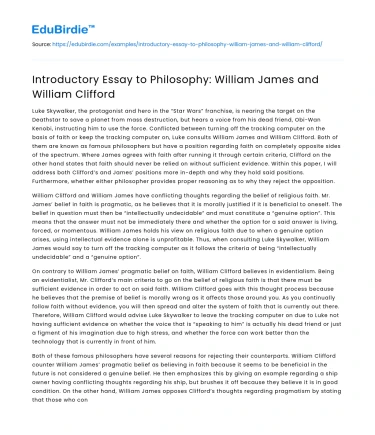Luke Skywalker, the protagonist and hero in the “Star Wars” franchise, is nearing the target on the Deathstar to save a planet from mass destruction, but hears a voice from his dead friend, Obi-Wan Kenobi, instructing him to use the force. Conflicted between turning off the tracking computer on the basis of faith or keep the tracking computer on, Luke consults William James and William Clifford. Both of them are known as famous philosophers but have a position regarding faith on completely opposite sides of the spectrum. Where James agrees with faith after running it through certain criteria, Clifford on the other hand states that faith should never be relied on without sufficient evidence. Within this paper, I will address both Clifford’s and James’ positions more in-depth and why they hold said positions. Furthermore, whether either philosopher provides proper reasoning as to why they reject the opposition.
William Clifford and William James have conflicting thoughts regarding the belief of religious faith. Mr. James’ belief in faith is pragmatic, as he believes that it is morally justified if it is beneficial to oneself. The belief in question must then be “intellectually undecidable” and must constitute a “genuine option”. This means that the answer must not be immediately there and whether the option for a said answer is living, forced, or momentous. William James holds his view on religious faith due to when a genuine option arises, using intellectual evidence alone is unprofitable. Thus, when consulting Luke Skywalker, William James would say to turn off the tracking computer as it follows the criteria of being “intellectually undecidable” and a “genuine option”.
Save your time!
We can take care of your essay
- Proper editing and formatting
- Free revision, title page, and bibliography
- Flexible prices and money-back guarantee
On contrary to William James’ pragmatic belief on faith, William Clifford believes in evidentialism. Being an evidentialist, Mr. Clifford’s main criteria to go on the belief of religious faith is that there must be sufficient evidence in order to act on said faith. William Clifford goes with this thought process because he believes that the premise of belief is morally wrong as it affects those around you. As you continually follow faith without evidence, you will then spread and alter the system of faith that is currently out there. Therefore, William Clifford would advise Luke Skywalker to leave the tracking computer on due to Luke not having sufficient evidence on whether the voice that is “speaking to him” is actually his dead friend or just a figment of his imagination due to high stress, and whether the force can work better than the technology that is currently in front of him.
Both of these famous philosophers have several reasons for rejecting their counterparts. William Clifford counter William James’ pragmatic belief as believing in faith because it seems to be beneficial in the future is not considered a genuine belief. He then emphasizes this by giving an example regarding a ship owner having conflicting thoughts regarding his ship, but brushes it off because they believe it is in good condition. On the other hand, William James opposes Clifford’s thoughts regarding pragmatism by stating that those who constantly try to find evidence for a belief will be in a continual predicament of suspense and will never arrive at a true belief. But in my genuine opinion, Luke Skywalker should turn the tracking computer off as he saw firsthand what the force does from Obi-Wan Kenobi (the voice that Luke hears while piloting the X-Wing) and Darth Vader, giving him sufficient evidence before the mission that the force is more than a religious belief.
Did you like this example?
Make sure you submit a unique essay
Our writers will provide you with an essay sample written from scratch: any topic, any deadline, any instructions.
Cite this paper
-
APA
-
MLA
-
Harvard
-
Vancouver
Introductory Essay to Philosophy: William James and William Clifford.
(2022, September 27). Edubirdie. Retrieved December 22, 2024, from https://edubirdie.com/examples/introductory-essay-to-philosophy-william-james-and-william-clifford/
“Introductory Essay to Philosophy: William James and William Clifford.” Edubirdie, 27 Sept. 2022, edubirdie.com/examples/introductory-essay-to-philosophy-william-james-and-william-clifford/
Introductory Essay to Philosophy: William James and William Clifford. [online].
Available at: <https://edubirdie.com/examples/introductory-essay-to-philosophy-william-james-and-william-clifford/> [Accessed 22 Dec. 2024].
Introductory Essay to Philosophy: William James and William Clifford [Internet]. Edubirdie.
2022 Sept 27 [cited 2024 Dec 22].
Available from: https://edubirdie.com/examples/introductory-essay-to-philosophy-william-james-and-william-clifford/
copy






 Stuck on your essay?
Stuck on your essay?

